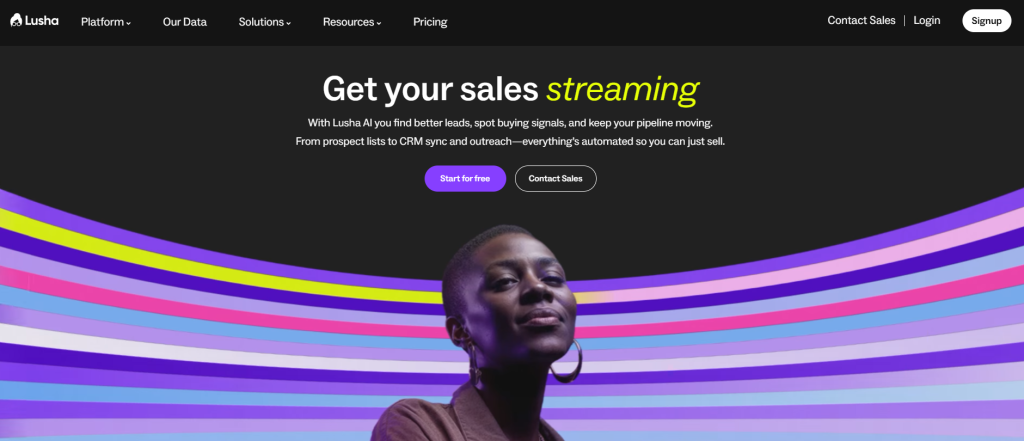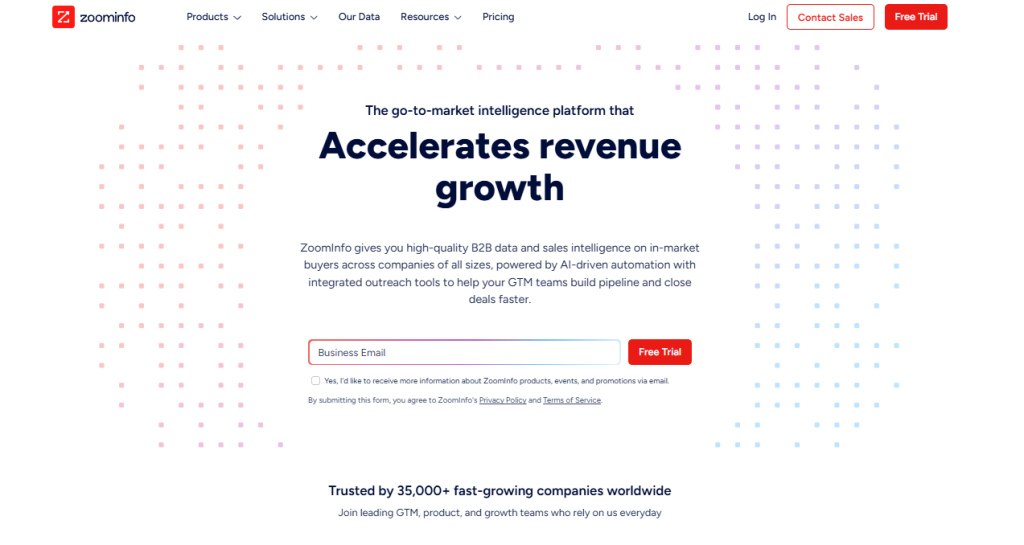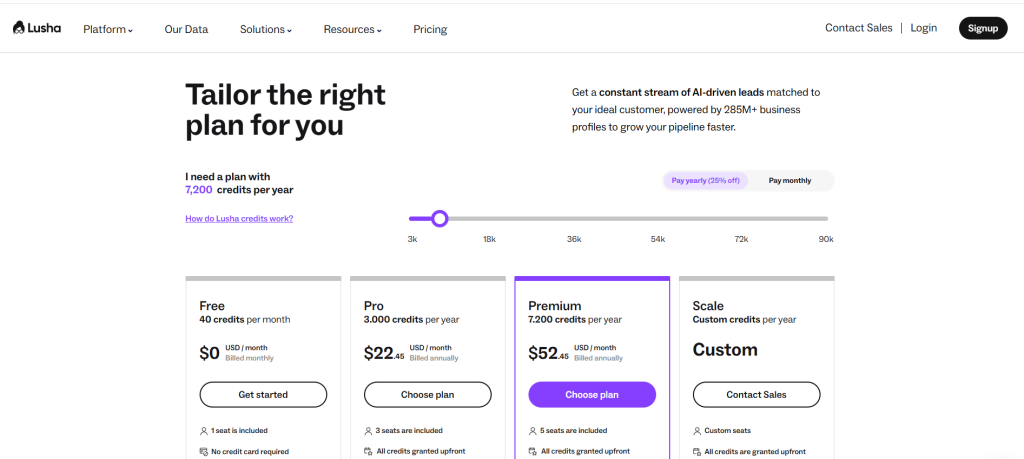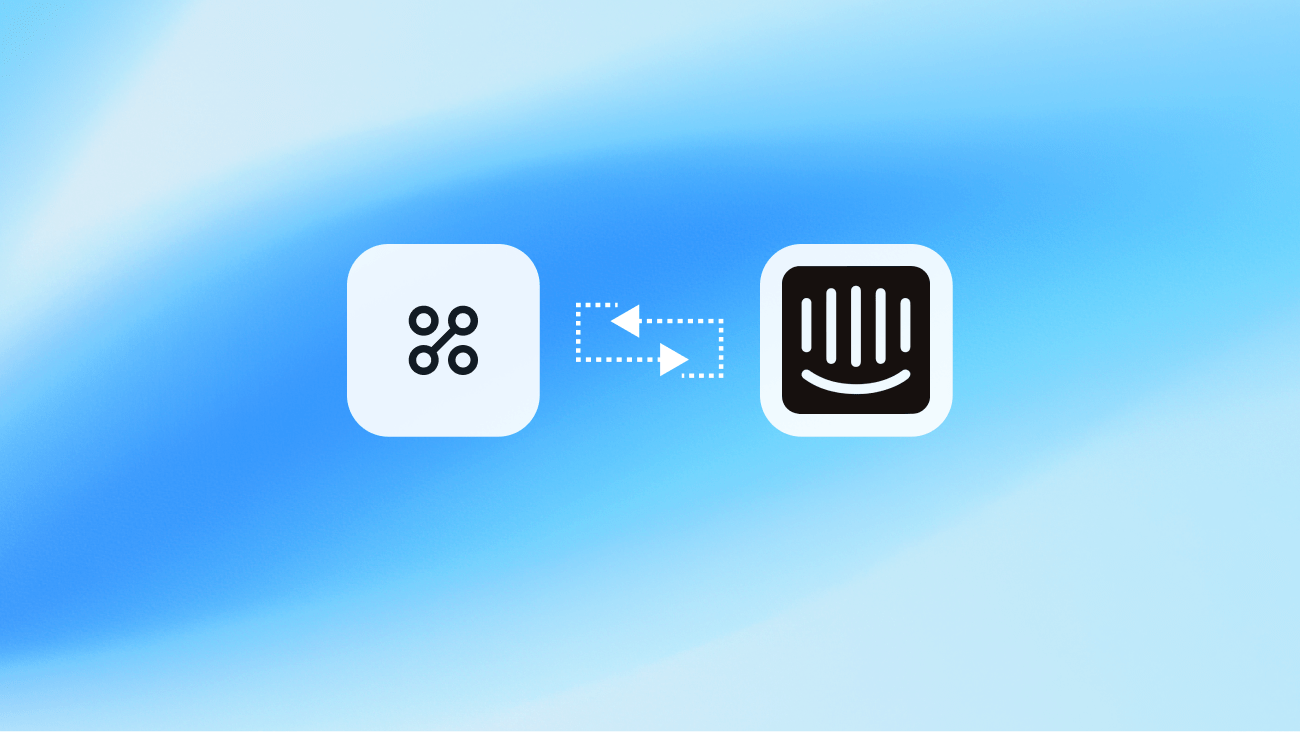As a marketer, one of your main goals is generating leads that your sales teams can convert into customers. High quality data is essential for successful lead generation. Many software options on the market can provide accurate contact data, including ZoomInfo and Lusha. So, how do you know which one is right for your business? Here’s the ultimate Lusha vs ZoomInfo comparison!
Choosing between Lusha and ZoomInfo feels like a classic David vs. Goliath battle. Do you bet on Lusha’s affordable, nimble approach, or invest in ZoomInfo’s enterprise-grade data powerhouse? This guide cuts through the marketing fluff to give you the real data on pricing, data accuracy, and contract traps, so you can make a decision that won’t burn your budget or your sales teams.
Lusha vs ZoomInfo (2025): Pricing, Data Accuracy, Contracts, and Best Use Cases [Verified]
| Feature | Lusha | ZoomInfo |
|---|---|---|
| Database Size (Contacts) | ~100M contacts / 15M companies (vendor-reported) | ~320M contacts / ~100M companies (industry-reported) |
| Ideal Use Case | Individuals, startups, SMBs | Large enterprise companies |
| Pricing Model | Transparent public pricing | Annual contracts only |
| Starting Price (Est. Annually) | Free plan available; Pro from ~$348/year | ~$15,000+ per year |
| Contract Type | Monthly/annual options | Annual contracts with auto-renew |
| G2 Rating (Ease of Use) | 9.0/10 | 8.9/10 |
| CRM Integrations | Available on Free plan | Extensive across all tiers |
Lusha vs ZoomInfo Comparison Guide
Which is better for lead generation: Lusha or ZoomInfo? This comprehensive guide will help you decide which is right for your business based on each tool’s key features, pricing, usability, and integration capabilities.
Lusha Overview
Lusha is a powerful lead generation software that offers detailed information from over 100 million business contacts and 15 million companies. The platform also includes features to help you turn leads into customers, such as data enrichment for better targeting sales outreach.
With a robust feature set and emphasis on quality data generation, Lusha is an excellent choice for mid-market companies looking to grow their businesses by expanding their sales pipeline. The platform complies with GDPR norms, making it a safe bet regarding security protocols. Moreover, the Lusha platform is designed with ease of use in mind, making it simple for sales and marketing teams to learn the platform in just a matter of clicks. As it has grown, more and more Lusha competitors are becoming available.

(Source: Lusha)
ZoomInfo Overview
ZoomInfo is an excellent resource for professional marketing searching for new potential clients. The comprehensive sales intelligence platform provides detailed information on over 320 million contacts and 100 million companies. Its intent signals empower your team with automated workflows that integrate seamlessly into many of your company’s existing software. In addition, ZoomInfo’s data enrichment tools make it possible for marketers to find precisely what they need when reaching out to target audience segments.
While the ZoomInfo platform has established itself as a leader in the sales intelligence space and boasts a competitive data set, it’s a complex tool. It can be relatively challenging to customize and integrate into your existing processes.

(Source: ZoomInfo)
What Is the Core Difference Between Lusha and ZoomInfo?
The core difference lies in their target customer and business model: Lusha is a self-service contact finder for SMBs with transparent pricing model, while ZoomInfo is a comprehensive go-to-market platform for enterprises requiring custom, high-ticket annual contracts.
Prospecting for new sales leads can be a time-consuming and frustrating process. To make matters worse, bad data can lead to wasted time and effort pursuing dead ends. That’s why it’s essential to have reliable contact details when building a list of potential customers.
Lusha offers users access to direct phone numbers and email addresses, while ZoomInfo focuses on providing detailed background information on companies and individuals across a variety of categories.
ZoomInfo offers more extensive database than Lusha, but its highly accurate database makes it a worthwhile investment for enterprise sales teams. When evaluating lead generation providers, consider the key features and pricing plans most suited to you and your outreach and sales teams.
Data & Accuracy: Who Has More Reliable Data?
Choosing a sales intelligence tool is challenging. There are many variables to consider; one of the most critical aspects is data quality. After all, what good is a platform if it doesn’t have accurate contact data? Let’s look at the data quantity, quality data, and types of data each platform offers.
Database Size and Coverage
When it comes to raw data quantity, ZoomInfo has a clear advantage. As of 2025, Lusha offers 100+ million business profiles and 15+ million company profiles, with 60+ million decision-maker email addresses and 50+ million direct dials (vendor-reported, Lusha). ZoomInfo boasts over 320 million contact profiles and over 100 million company profiles, with over 176 million email addresses and over 71 million direct dial phone numbers (industry-reported, Lindy).
However, data quantity is not the only factor in data accuracy. If you’re casting a wide net for your outreach, ZoomInfo’s extensive database is the clear winner. But for targeted prospecting with verified contact details, the quality of data matters more than sheer volume.
Data Quality and Verification
One strong aspect of Lusha’s offering is its data quality. Their proprietary algorithm filters for verified accounts to ensure you get reliable contact details. In addition, its machine learning technology gives you access to contact data and valuable company data. This makes it easy to find and connect with the right leads meaningfully.
Both Lusha and ZoomInfo claim to have the industry’s most accurate and up to date information. But how do they back up those claims? ZoomInfo offers an “Enrich Contact Data” feature, which uses APIs and webhooks to constantly update contact information. Based on G2’s comparison data (verified September 2025), for ‘Company Data Accuracy’, ZoomInfo scores 8.2 while Lusha scores 7.6. For ‘Contact Data Availability’, ZoomInfo scores 8.3-8.5 and Lusha scores 7.8.
When it comes to data integrity, ZoomInfo has the upper hand. Its granular data enrichment and segmentation features give users access to high quality data. Lusha, on the other hand, has dealt with reports of inaccurate or outdated company data (based on G2 user reviews, September 2025), which aren’t uncommon when it comes to popular sales intelligence tools.
How Do Lusha and ZoomInfo Handle Data Compliance?
Data compliance is a critical factor for global teams operating under GDPR and CCPA regulations. All major platforms claim compliance, but their approaches differ significantly.
Lusha Compliance Features:
- ISO 27701 certified (Lusha Privacy Policy)
- GDPR lawful basis: legitimate interest for B2B contacts
- DNC filtering for UK/US lists
- Opt-out portal available
- Data source disclosures provided
ZoomInfo Compliance Features:
- Location-based filtering tools
- API access for compliance management
- GDPR compliance tools
- DNC scrubbing capabilities
- Data processing agreements available
Both platforms place significant liability on users for compliance oversight. For comparison, competitors like Cognism differentiate by automatically scrubbing mobile numbers against 13 major DNC lists across multiple countries, offering the most comprehensive built-in compliance approach.
Verdict: Data Winner
Winner for Data Volume: ZoomInfo. Winner for Ease of Use: Lusha. Winner for Compliance: Neither – both require significant user oversight for global compliance.
Features: Prospecting, Intent Data, and Enrichment
One of the main differences between Lusha and ZoomInfo is their pricing models. Lusha offers a self-service, product-led model that is affordable for startups. ZoomInfo takes a more traditional sales approach with enterprise pricing plans that can be prohibitively expensive, especially for small businesses looking to scale.
While Lusha is easy to adopt due to its self-service model, ZoomInfo’s strength lies in the platform’s ability to garner high quality data from over 320 million contacts in the B2B space.
Data Enrichment and Intent Signals
The data Lusha generates is verified for accuracy and enriched with additional information such as location, industry, revenue size, title, seniority, and more. This makes Lusha’s data an invaluable resource for sales and marketing professionals looking for reliable leads across various dimensions.
ZoomInfo’s vast database offers a range of data types to enhance your prospecting process. Their data types include contact data, company data, intent data, and website visitor data. ZoomInfo’s buyer intent is particularly powerful for identifying companies actively researching solutions, but it comes as a costly add-on to an already five-figure annual contract, a risk many SMBs can’t afford.
Intent Data Breakdown:
- ZoomInfo: Real time intent signals from 300,000+ publisher domains, keyword tracking, recency filters, and noise reduction algorithms
- Lusha: Basic intent signals available through integrations, limited native intent capabilities
Prospecting Filters and List Building
Lusha offers a simple interface that makes it easy to find the data you need. The platform provides access to both business contacts and personal contact data, including email addresses, phone numbers, and social media profiles. It also includes the ability to verify email addresses and phone numbers in real time to ensure accuracy, with regular updates to ensure that your data is always current.
ZoomInfo offers powerful search functionality that allows you to find the contact details you need quickly and easily. The platform includes the ability to segment your search results so that you only see the most relevant data, detailed contact data including verified contact details, direct dial numbers, and LinkedIn profiles, plus access to 300,000 publisher domains for intent signals.
Advanced Prospecting Features:
- Technology Install Data: ZoomInfo tracks 15,000+ technologies; Lusha offers basic tech stack data
- Org Chart Mapping: ZoomInfo provides detailed hierarchy data; Lusha offers basic reporting structure
- Department/Level Filters: Both platforms offer role-based filtering with ZoomInfo providing more granular options
Integrations: Philosophy and Ecosystem
When considering sales intelligence software, it’s important to consider each tool’s integration capabilities. This essential feature of every reputable sales intelligence tool can make or break your experience on the platform. Without an easy way to make your systems talk to each other, you’re stuck with manual data entry methods of handling your key processes. When it comes to lead generation software, the more seamless integrations a tool has, the more value it can add to your company.
ZoomInfo’s strategy is to be an all-in-one platform, providing a comprehensive suite of tools for sales, marketing, and operations (SalesOS, MarketingOS, OperationsOS via RingLead acquisition), including its own sales engagement tool ZoomInfo Engage with automated sales flows, dialer, and email automation. In contrast, Lusha’s philosophy is to be a best-in-class data provider that integrates seamlessly into existing tech stacks, focusing on providing accurate contact data that works with popular CRM and Sales Engagement Platforms like Salesforce, HubSpot, Outreach, and Salesloft.
As of January 2025, Lusha now offers CRM integrations on their free plan, including basic Salesforce, HubSpot, and other major CRM connections (Lusha Pricing FAQ, verified January 2025). Advanced integrations, API access, and enterprise-level controls remain on the Scale plan. ZoomInfo offers integrations with 14+ CRMs, including Salesforce Pardot and ATS tools like Greenhouse and JobDiva across all tiers.
Integration Depth Comparison
| Integration Feature | Lusha | ZoomInfo |
|---|---|---|
| Field-level mapping | Basic (Scale plan) | Advanced across all tiers |
| De-duplication | Limited | Advanced with OperationsOS |
| Enrichment cadence | Manual/batch | Real-time API available |
| Webhook/API access | Scale plan only | All tiers (usage limits apply) |
| Reverse ETL support | Limited | Full support via OperationsOS |
Lusha Integrations
Lusha’s key integrations include the following (now available on free plan as of 2025):
- Salesforce
- HubSpot
- Outreach
- Microsoft Dynamics
- Gmail
- Pipedrive
- Zoho
- Bullhorn
ZoomInfo Integrations
ZoomInfo’s most notable integrations include the following:
- Marketo
- HubSpot
- Salesforce
- Google Cloud
- Microsoft Dynamics
- Greenhouse
- Slack
- Zoho CRM
This is where a flexible alternative like UpLead shines. With native integrations for Salesforce, HubSpot, Pipedrive, and more, available on accessible plans, you can connect your stack without an enterprise budget. UpLead integrates with major CRMs and offers API access across all paid tiers.
Pricing & Value: What’s the Real Cost?
ZoomInfo and Lusha offer different pricing models. ZoomInfo provides a free trial and customized plans based on the user’s needs. Lusha has a free plan for small businesses and self-service plans with incremental usage limits.
Both tools offer a variety of advanced features, but ZoomInfo’s focus on customization means that users may end up paying more for the same features Lusha offers. Lusha offers a self-service approach that makes onboarding easy.
Lusha Pricing
Lusha offers a free trial and has a basic, free plan. In contrast, ZoomInfo does not offer a free plan. It’s also worth noting that Lusha offers a 25% discount for buying an annual plan instead of a monthly subscription.
As of January 2025, Lusha lists plans publicly with transparent pricing. The free plan includes basic CRM integrations and up to 70 credits per month. Lusha’s pricing model breaks down into four tiers:
- Free: Up to 70 credits per month, basic CRM integrations included, up to 1 user
- Pro: Third-party sources show $22.45-$37 per user per month (billed annually) with 480-6,000 credits per user, B2B list management, and basic team management (Vendr deal data)
- Premium: Third-party sources show $51-$60 per user per month (billed annually) with 960-12,000 credits per user, bulk prospecting, and usage analytics
- Scale: Custom pricing with advanced integrations, API access, advanced team management, usage analytics, and customer support manager
Important Credit Rollover Rules: Monthly plans allow credit rollover up to 2× the monthly cap. Annual plans provide all credits upfront but unused credits reset at cycle end with no rollover (Lusha Pricing FAQ, verified January 2025).

ZoomInfo Pricing
ZoomInfo’s pricing brings a more complex pricing model, with add-ons and support levels that vary based on each customer’s use case. While the exact prices depend on the customization and usage needed for your organization, ZoomInfo is one of the most expensive tools on the market.
ZoomInfo does not publicly disclose its pricing but based on multiple reputable secondary sources from 2024 and 2025 (Fifty Five and Five, Evaboot), the estimated annual starting prices are:
- Professional+: ~$14,995/year with contact and company profiles, verified phone numbers and email addresses, and CRM functionality
- Advanced+: ~$24,995/year with location data, hierarchy information, and social media profiles
- Elite+: ~$39,995/year with real-time buyer intent data and advanced company attributes
These are base estimates for a small number of users (typically 1-3) and a set number of credits. Common add-on estimated costs include Worldwide Data (~$9,995/year), Intent Data ($9,000-$40,000/year depending on scope), and API access (starting around $50,000/year). All contracts are typically annual or multi-year with no monthly subscription options available.
What Teams Actually Pay
Based on recent deal data from Vendr and marketplace insights:
- Lusha: Teams of 5-10 users typically pay $1,500-$4,000 annually with negotiated discounts
- ZoomInfo: Teams of 5-10 users typically pay $25,000-$75,000 annually including common add-ons
Contract Gotchas: What You Need to Know Before Signing
Understanding the true cost of ownership goes beyond the sticker price. Both platforms have contract terms and credit policies that can significantly impact your budget.
ZoomInfo Contract Risks:
ZoomInfo requires annual contracts with aggressive auto-renew clauses requiring 60-day notice to cancel. Multiple BBB complaints describe surprise renewals costing tens of thousands of dollars with no renewal reminders sent. A recent class-action lawsuit alleges ZoomInfo uses “manipulative and coercive auto-renew policies and threats of litigation to force customers into remaining” with them. Additionally, ZoomInfo recently settled a $13.3 million privacy settlement regarding data collection practices.
Lusha Contract Terms:
Lusha offers more flexible terms with monthly and annual options. However, their credit rollover policy can impact value: monthly plans cap rollovers at 2× the monthly limit, while annual plans provide all credits upfront but any unused credits expire at year-end without rollover (Lusha FAQ, verified January 2025). This means if you don’t use your credits, you lose them completely on annual plans.
The contract trap is a significant risk factor that many buyers overlook when evaluating these platforms. Consider not just the monthly cost, but the total commitment and workflow efficiency you’ll have to adjust your usage.
Who Is Lusha Best For vs. Who Is ZoomInfo Best For?
Choosing the right platform depends heavily on your company size, budget, and specific use case requirements.
Lusha is best for:
- Outbound SDRs doing LinkedIn-first prospecting with occasional dials → Lusha Pro/Premium provides the chrome extension and direct contact data needed
- Individuals, startups, and SMBs who need a fast, easy-to-use tool for finding accurate contact details with a simple interface
- Teams focused on lead generation via LinkedIn with the web extension for real-time prospecting
- Budget-conscious teams that need to maximize every dollar and want to avoid long-term contract commitments
ZoomInfo is best for:
- RevOps teams needing enrichment, routing, de-dupe, and intent data → ZoomInfo SalesOS + OperationsOS provides comprehensive business contact information
- Large enterprise companies with dedicated budgets for comprehensive go-to-market platforms
- Complex lead generation needs requiring deep company and contact data, advanced search filters, and buyer intent signals
- Teams needing integrated sales/marketing automation tools within a single platform ecosystem
For EMEA compliance-sensitive teams, consider Cognism as an alternative that offers more comprehensive built-in compliance features.
If you’re a solopreneur or startup, the five-figure entry price and rigid annual contract of ZoomInfo are likely non-starters. Conversely, if you’re an enterprise sales team with a dedicated budget that needs the deepest possible firmographic data, ZoomInfo is the market leader.
Which is Better, Lusha or ZoomInfo?
Both Lusha and ZoomInfo offer a wealth of information that can be extremely helpful for sales and marketing teams. When it comes down to selecting the most effective sales intelligence platform for your business, there are a couple of factors to consider.
Consider which program is most affordable on your current budget. ZoomInfo offers three different pricing plans customized based on your organization’s needs. Lusha, on the other hand, has a free plan and starts at just $29 per month. So, if the price is a significant consideration for your business or you’re a startup looking to scale at a relatively low cost, Lusha may be the better option.
Both Lusha and ZoomInfo offer many advanced features, including contact details and company information, email addresses, social media profiles, and more. However, ZoomInfo’s data is generally considered higher quality than Lusha’s; the former has been in business longer and has had more time to build a robust proprietary database. So if you’re looking for reliable data that you can count on for a large enterprise, ZoomInfo may be the right choice to meet your complex lead generation needs.
When evaluating sales intelligence tools, there’s no one-size-fits-all solution. The right tool serves your business will depend on your organization’s specific needs, budget, and goals.
Best Lusha and ZoomInfo Alternatives
While comparing Lusha vs ZoomInfo dominates the conversation, several other platforms offer compelling alternatives that might better fit your specific needs and budget.
UpLead: The Smart Money Choice
UpLead offers the 95% data accuracy that enterprises demand, but with the flexible, transparent pricing model that SMBs need. With 160M+ comprehensive business contact information and real-time email verification across 8 verification steps, UpLead provides enterprise-grade data quality without the enterprise price tag. Pricing starts at $99/month for 170 credits with native CRM integrations available on all paid plans.
Apollo.io: All-in-One GTM Platform
Apollo.io combines a B2B database with built-in sequencing, dialer, and analytics, positioning it as a GTM suite for smaller teams. Pricing starts at $49/user/month with transparent pricing plans. It’s particularly strong for teams that want prospecting and outreach in one platform.
Cognism: Premium EMEA-Focused Platform
Cognism positions itself as the primary compliant alternative to ZoomInfo, especially for European data. Key selling point is phone-verified “Diamond Data®” and rigorous GDPR approach by scrubbing against 13 major DNC lists. Pricing is custom but ranges from $1,500 to over $25,000 annually depending on tier.
Other Notable Alternatives
- Seamless.AI: Real-time AI-powered search with 1.8B contacts, though users report 20-30% email bounce rates
- Kaspr: LinkedIn-focused chrome extension, particularly strong in European markets
- SalesIntel: Human-verified data with 95% accuracy claims, starting around $18,000/year for teams
- Hunter.io: Simple email finder with free plan, limited to email addresses only
- RocketReach: 700M+ professionals database with pricing from $53-$359/month
- LeadIQ: Simplified prospecting with AI email writer, starting at $15/month
Why Choose Uplead Instead
Choosing the right sales intelligence software is crucial for the success of your business. The tools you use to gather data about potential customers can make or break your marketing efforts. ZoomInfo and Lusha are popular options but not the only ones.
Here are a few excellent reasons you should choose Uplead for your marketing needs:
Great for All Business Sizes
Uplead offers pricing plans for all use cases, whether you’re a solopreneur just starting or a large enterprise with a big budget.
Reliable Data
With Uplead, you can be confident that the data you’re collecting is accurate. The platform boasts a high data accuracy rate, so you don’t have to worry about whether the data is valid—you can focus on using the information to close deals.
Ease of Use
Uplead’s platform is designed with the user in mind. Sales intelligence tools can be complicated, so the software has a straightforward interface ready to be adopted immediately.
When choosing sales intelligence software, there are many factors to consider. In a direct comparison, it’s clear that Uplead is a worthy competitor of ZoomInfo and Lusha. With its flexible pricing models and reliable data, Uplead is the perfect business intelligence tool for businesses of all sizes. Its excellent usability makes starting a breeze so that you can see results immediately.
Frequently Asked Questions
Is Lusha legal to use in the EU?
Yes, Lusha is legal to use in the EU. Lusha operates under GDPR lawful basis of legitimate interest for B2B contacts and maintains ISO 27701 certification (Lusha Privacy Policy). However, users remain responsible for ensuring their specific use cases comply with local regulations.
Does ZoomInfo auto-renew?
Yes, ZoomInfo contracts typically auto-renew with 60-day notice requirements. Multiple BBB complaints describe customers being surprised by automatic renewals without adequate notice, leading to unexpected charges of tens of thousands of dollars.
Does Lusha work without LinkedIn?
Yes, Lusha works without LinkedIn through their web app platform. While the chrome extension is optimized for LinkedIn prospecting, Lusha’s web application provides search functionality independent of LinkedIn for finding business contacts and company data.
What You Need to Remember About Lusha vs ZoomInfo
When choosing between Lusha and ZoomInfo, there’s no easy answer. Both platforms offer many key features and benefits that can be extremely helpful for sales and marketing teams. The best way to determine which sales intelligence platform is right for you is to carefully consider your specific needs and budget restrictions. Consider using Uplead, which combines the best of both worlds into one robust, accessible tool.





